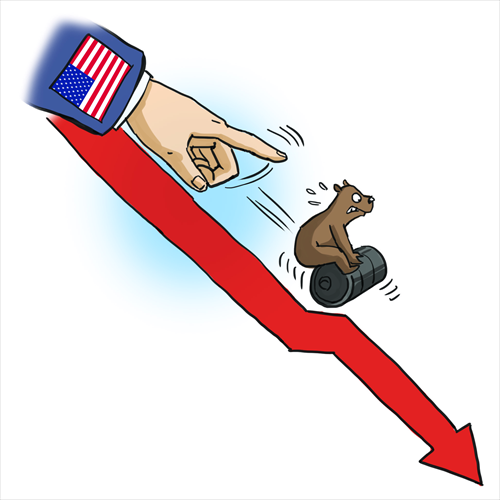HOME >> OP-ED
US strategy lies behind dramatic oil fall
By Ma Hong Source:Global Times Published: 2015-1-27 20:28:02

Illustration: Liu Rui/GT
Oil is an important strategic resource. The fluctuation of oil prices can profoundly influence on economy, politics, military and diplomacy. Since the summer of 2014, international oil prices have been plummeting, which has not only dealt a heavy blow to the economy of oil producers, but also triggered changes in international geopolitics.When analyzing the price fall and its impact, observers have paid attention on oil giants such as OPEC, Saudi Arabia and Russia, but they have neglected that the US, the world's largest consumer of oil and one of the top oil and gas production countries, has substantial influence on international geopolitics. Therefore, the US' moves amid the fluctuation of oil prices are worth watching.
The primary reason of the price fall is unbalanced supply and demand. Nonetheless, the fierce impetus, the long duration and huge impact can be attributed to the US' plans to seek its own geopolitical goals.
Since the Ukrainian crisis, Europe and the US have imposed several rounds of sanctions on Russia. Russian President Vladimir Putin has carried out countermeasures. But the oil price decline lent a helping hand to the US, which set Russia into predicament.
The US has seized this opportunity and wooed Saudi to increase its oil production and ease the embargo on US crude oil export, which further triggered the plummet in oil prices and suppressed Russia. Under the push by both the US and Saudi, the international oil prices will continue to fall for a long time, and countries like Russia will face more difficulties.
Due to Western sanctions and falling oil prices, Russia, which relies on oil exports, has run into the dilemma of the depreciation of ruble. But so far, Putin's ruling status has not been shaken. To deal with the current dilemma, Russia has softened its tone on the Ukrainian crisis. Meanwhile, it has been engaged in developing its Far East and made progress in cooperating with China in energy and military.
Some European leaders have also realized that a collapse in Russia would pose huge political, economic and security risks on their countries. Therefore, the geographic advantage of Russia which sits between Asia and Europe will help it endure the dual strike. This also means that China, while enhancing the strategic partnership with Russia, should promote international cooperation in the energy sector to avoid overdependence on Russia.
The declining oil prices have reduced the US dependence on the Middle East for crude oil and also accelerated the pace of US withdrawal from war-torn countries such as Iraq and Afghanistan, leaving room for the growth of IS. Countries such as Iraq, Iran and Syria can hardly find a peaceful path, and the Middle East will sink into long-term chaos.
For instance, Iran used to be a hardliner in opposing the US among OPEC and reduced production when oil price fell. But at a time when it seeks to ease confrontation with the West, it has to boost oil export and increase income from it. Therefore, it has opened up production to full throttle and shown a cooperative stance with the West to fight against IS.
Finally, the US also takes the chance to push forward its rebalancing toward Asia strategy, which intensifies the disputes in the South China Sea and the East China Sea, thus complicating global security situation.
Some analysts have pointed out that energy independence is not the final goal of US strategies. The real long-term goal envisioned by the US leadership is that by increasing the oil production of the US itself and its neighboring stable countries and reducing import from unstable regions such as the Middle East and Africa, the US can ensure its energy security, thus at the same time enabling it to shift focus to the Asia-Pacific region where the US claims that it has more interests and carry out its pivot to Asia strategy.
The author is a senior research fellow at the Academy of Chinese Energy Strategy, the China University of Petroleum, Beijing. opinion@globaltimes.com.cn
Posted in: Viewpoint